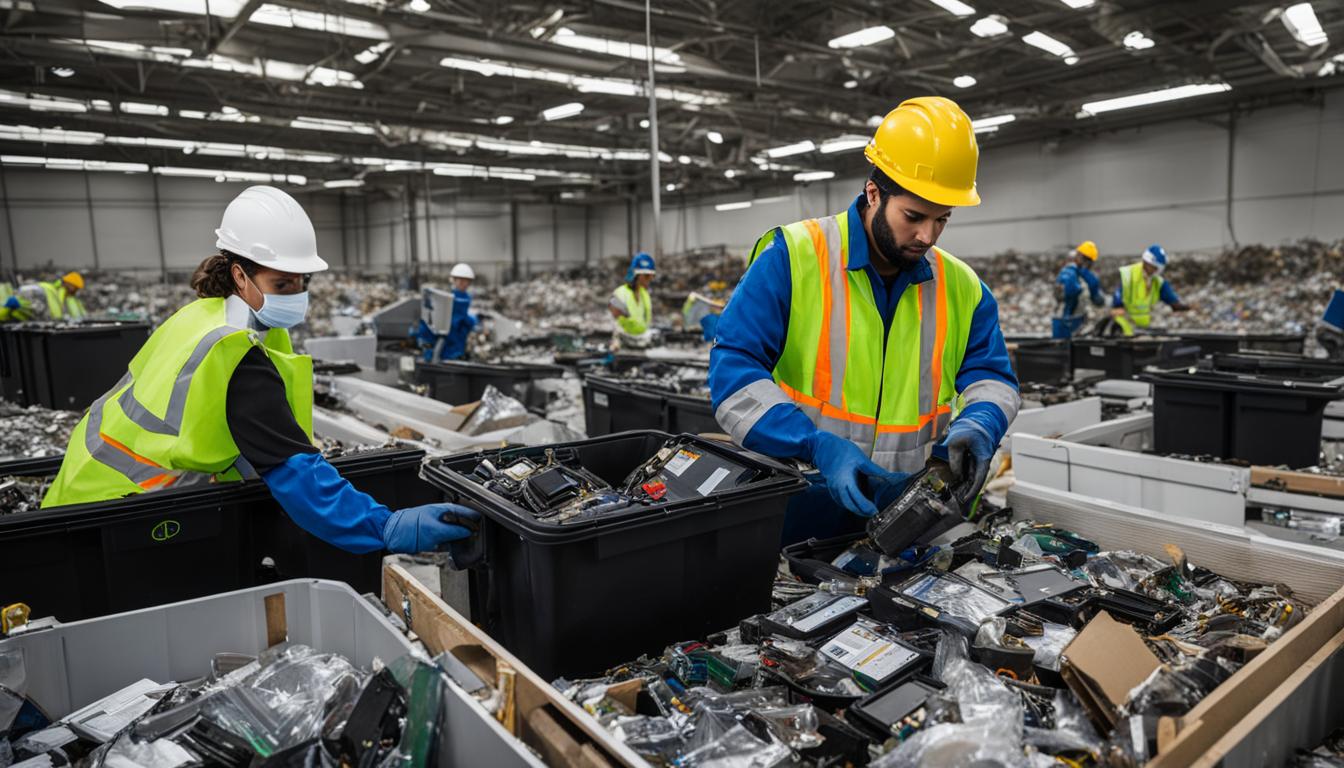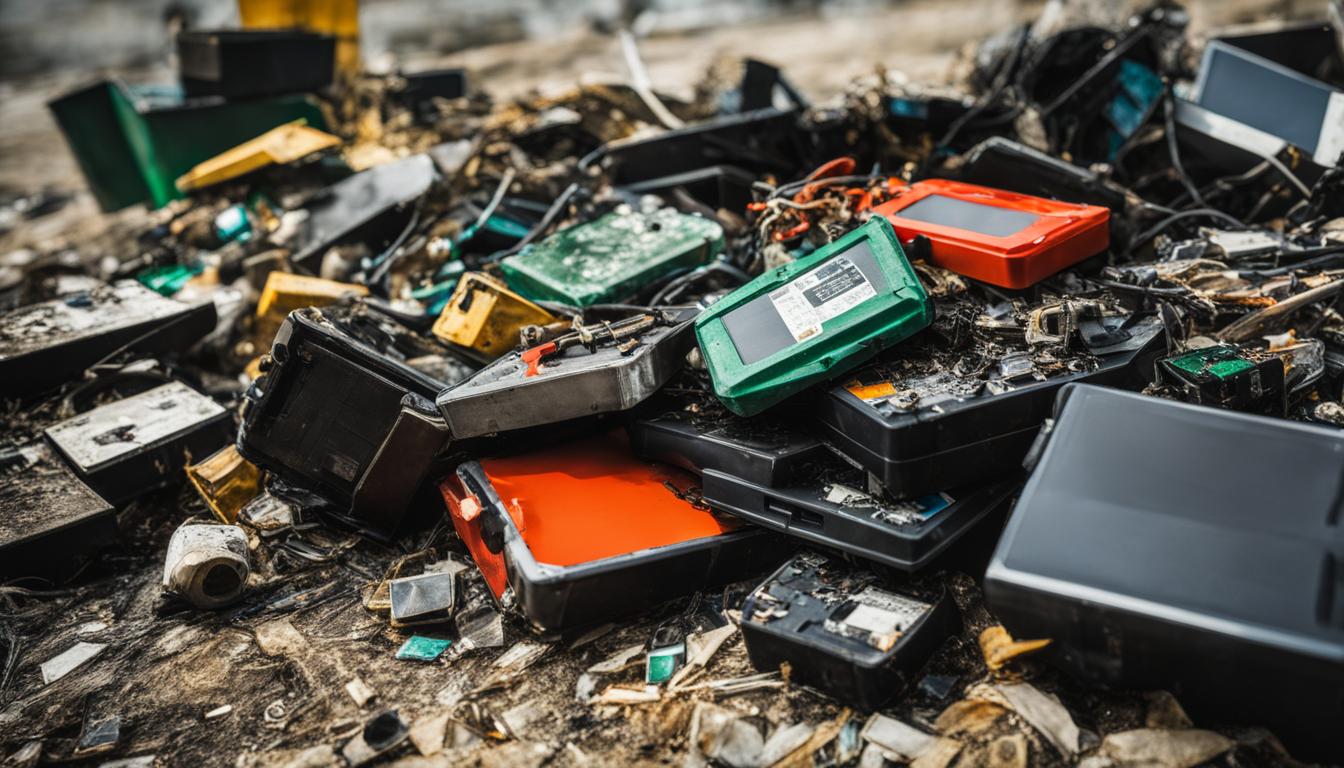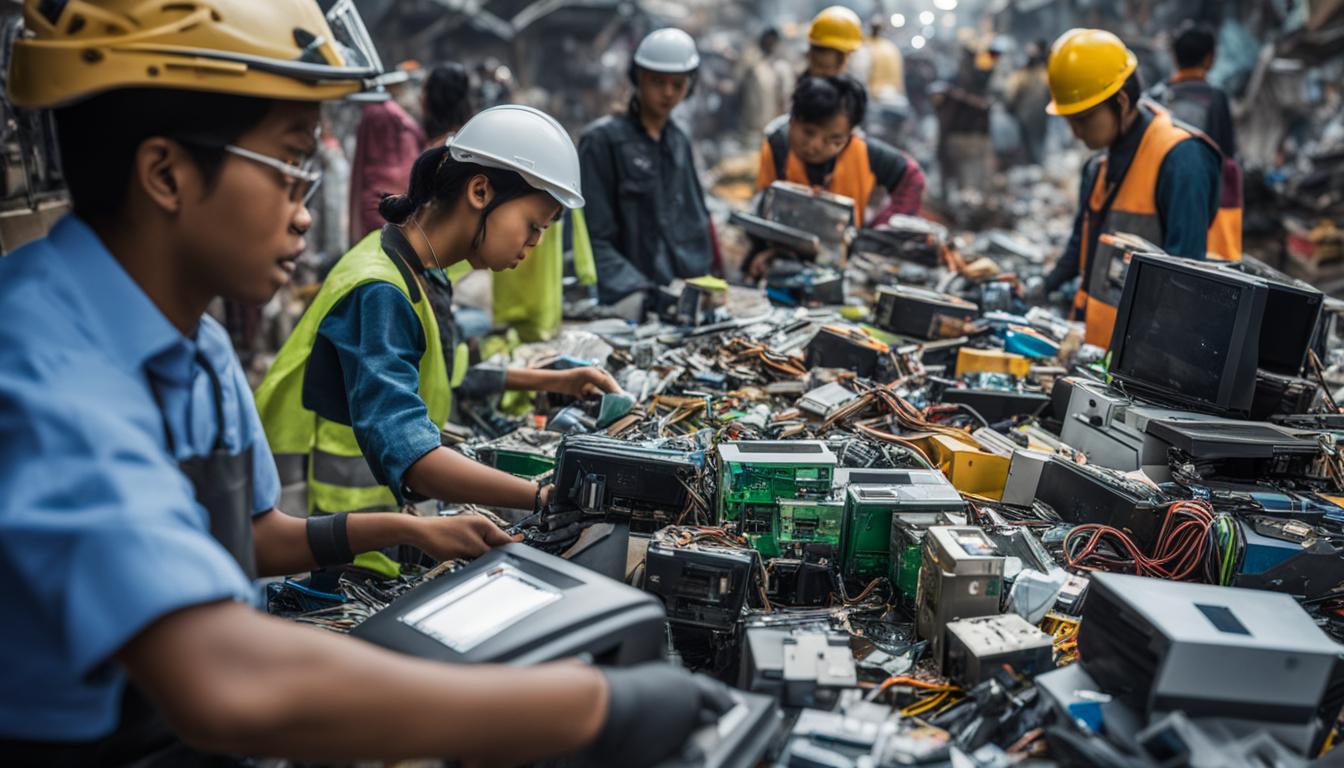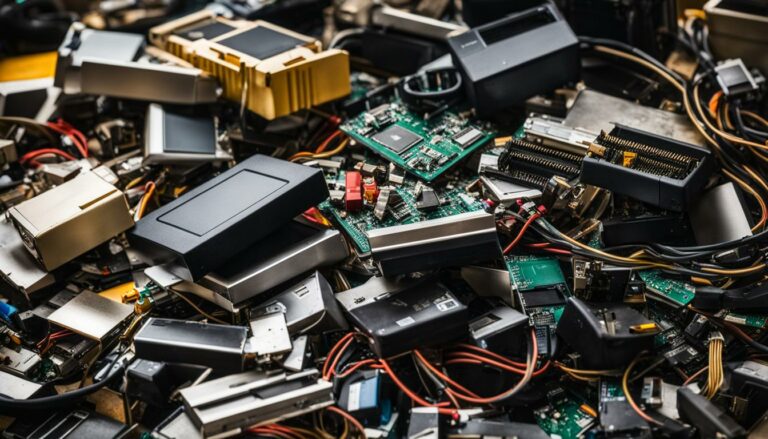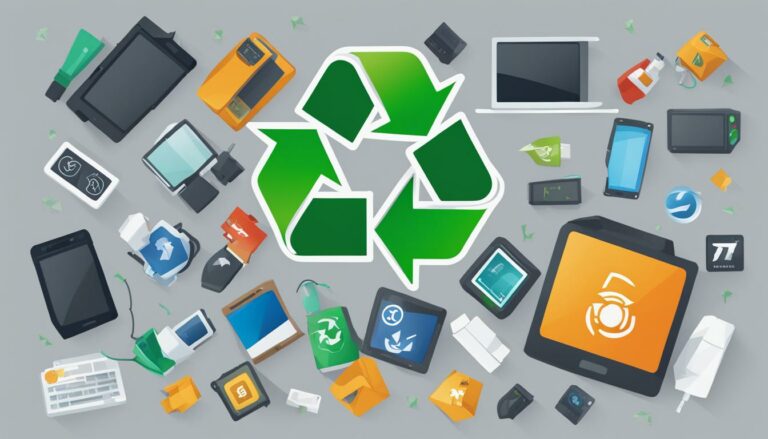Collaborative Efforts in Global IT Recycling Initiatives
Global e-waste is a growing concern, with an estimated 53.6 million metric tons generated in 2020 and projections of reaching 75 million metric tons by 2027. While Asia is the largest contributor to global e-waste (accounting for 24.9 metric tons), Europe leads in e-waste recycling with a rate of 42.5%. Only 71% of countries worldwide have legislation or regulations regarding e-recycling. The Global 2030 Agenda for Sustainable Development aims to bring positive change to e-waste management through sustainable production and consumption practices. The Basel Convention, signed in 1989, is an international treaty that reduces the transportation of hazardous waste. China’s National Old-For-New Home Appliance Replacement Scheme and the Closed Loop Partners Program provide examples of successful e-waste recycling initiatives. Canada’s Electronic Products Recycling Association (EPRA) and the European Union’s RoHS and WEEE Directives also play a significant role in promoting responsible IT recycling.
Key Takeaways
- Collaborative efforts are essential for addressing the global challenge of e-waste management.
- Global IT recycling collaborations and partnerships play a crucial role in promoting responsible electronic disposal.
- Initiatives such as the Basel Convention and national programs demonstrate successful e-waste recycling.
- Legislation and regulations are needed to ensure proper IT recycling practices worldwide.
- The Global 2030 Agenda for Sustainable Development emphasizes sustainable production and consumption practices for e-waste management.
Grassroots Initiatives: The Foundation of NGO-Led E-waste Management
NGOs play a vital role in promoting responsible electronic disposal through grassroots initiatives. These organizations understand the importance of community engagement and raise awareness at the local level. By organizing workshops, educational programs, and community recycling drives, NGOs create platforms for individuals and businesses to actively participate in sustainable e-waste management.
Community recycling drives serve as collection points where individuals can drop off their electronic devices for proper disposal. These drives are often organized in collaboration with local businesses, schools, and community centers. By partnering with NGOs, these organizations can contribute to the responsible recycling of electronic waste.
Furthermore, NGOs conduct educational programs that aim to instill a sense of responsibility and awareness about the impact of e-waste on the environment. These programs are often conducted in schools and community centers, reaching a wide audience and fostering a culture of sustainable e-waste management. By educating individuals about the importance of responsible electronic disposal, NGOs empower communities to take action and make a positive impact.
In summary, grassroots initiatives led by NGOs serve as the foundation for e-waste management. Through community recycling drives and educational programs, NGOs engage individuals and businesses in responsible electronic disposal. By raising awareness at the local level, these initiatives contribute to the larger goal of creating a sustainable future for IT recycling.
Collaborative Efforts: The Power of NGO Partnerships for Recycling
NGO partnerships for recycling play a crucial role in driving large-scale change in IT recycling programs and fostering a circular economy. These partnerships bring together NGOs, governmental agencies, and private corporations, creating comprehensive IT recycling initiatives with mutual benefits. Through public-private collaborations, e-waste collection and recycling rates are enhanced, while also encouraging the repurposing of e-waste into new technological solutions.
The tech industry plays a significant role in these collaborations, contributing to the development of innovative ways to maximize the utility of electronic components and minimize waste. By working together, NGOs and tech companies can create a sustainable and efficient IT recycling ecosystem.
One notable example of successful NGO partnerships is the Electronics TakeBack Coalition, which works with various environmental organizations, businesses, and government agencies to promote responsible e-waste management. Through their collective efforts, they have successfully advocated for the implementation of legislation such as the Responsible Recycling (R2) Standard and the e-Stewards Certification, which ensure the responsible handling of electronic waste and the protection of human health and the environment.
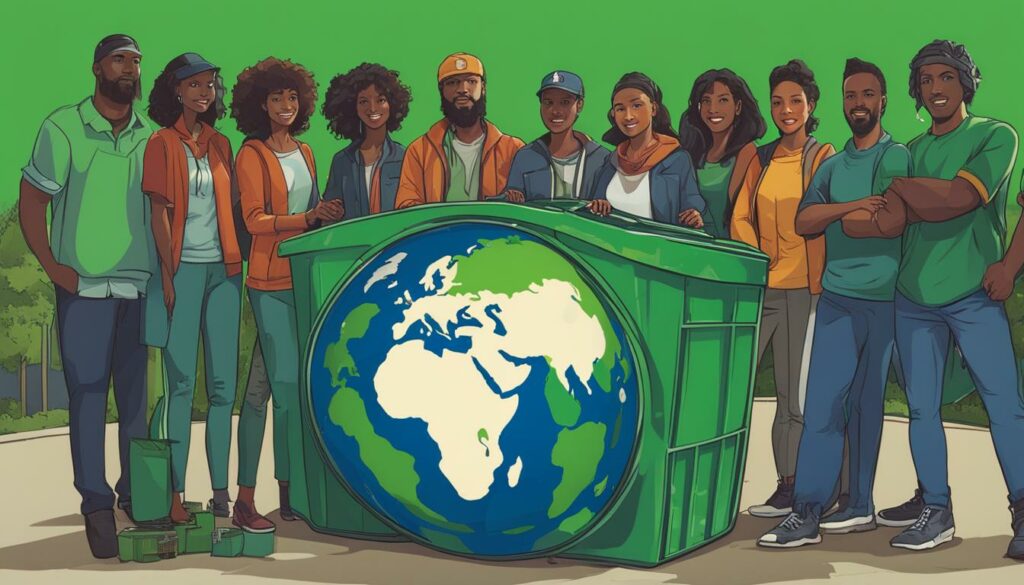
Table: Successful NGO Collaborations in IT Recycling
| NGO | Partner | Initiative |
|---|---|---|
| Electronics TakeBack Coalition | Environmental organizations, businesses, government agencies | Advocacy for responsible e-waste management and implementation of certifications |
| Computers for Schools | Technology companies, educational institutions | Refurbishing and donating computers to schools |
| Close the Loop | Manufacturers, recyclers | Recycling printer cartridges into new products |
These examples demonstrate how NGO collaborations are instrumental in promoting responsible IT recycling and creating a more sustainable future. By working together, NGOs, governments, and businesses can make a significant impact in reducing e-waste and ensuring the proper disposal and recycling of electronic devices.
Policy Advocacy: Shaping the Future of IT Recycling
NGOs play a crucial role in shaping the future of IT recycling through policy advocacy. By engaging in research and data collection, they provide valuable insights into the scale of e-waste and the effectiveness of recycling programs. Armed with evidence, NGOs use lobbying efforts to influence decision-makers at local and international levels, advocating for legislative frameworks that promote responsible electronic disposal. Their dedication extends to public campaigns, which build public support for policy proposals and create a groundswell of opinion that drives policy changes.
Research and data collection form the foundation of effective policy advocacy. NGOs gather information on the environmental impact of e-waste and the benefits of recycling, using this knowledge to inform their lobbying efforts. By presenting their findings to policymakers, they highlight the urgent need for comprehensive legislative frameworks that address the growing global e-waste crisis.
In addition to research and lobbying, NGOs also use public campaigns to shape the future of IT recycling. These campaigns raise awareness among the general public, highlighting the environmental and social consequences of improper e-waste disposal. By mobilizing public support, NGOs increase the pressure on policymakers to enact relevant legislation and implement sustainable IT recycling practices.
Through their policy advocacy efforts, NGOs are driving change in IT recycling and paving the way for a more sustainable future. Their valuable research, lobbying efforts, and public campaigns contribute to the development of comprehensive legislative frameworks that prioritize responsible electronic disposal and promote a circular economy. With their dedication and expertise, NGOs are shaping the future of IT recycling and creating a positive impact on the global e-waste crisis.
Global Impact: NGOs as Catalysts for International Change
NGOs are instrumental in driving international collaboration and creating solutions for IT recycling on a global scale. Through partnerships and participation in global forums, they actively contribute to the discourse on e-waste management and the development of sustainable practices.
International collaborations between NGOs from different countries are essential for sharing knowledge and expertise in IT recycling. These collaborations facilitate the exchange of best practices and the development of cross-border recycling programs. By working together, NGOs can address the unique challenges faced by different regions and create effective strategies for managing e-waste.
Research Publications
NGOs also play a significant role in advancing the field of IT recycling through research publications. Their studies and findings contribute to the global understanding of e-waste management and provide valuable insights for policymakers and the public. By sharing knowledge and raising awareness, NGOs help shape the future of IT recycling.
“NGOs have a crucial role to play in addressing the global e-waste problem. Through collaborations and research publications, they bring together diverse perspectives and expertise to drive meaningful change.” – Environmental Research Institute
Participation in Global Forums
NGOs actively engage in global forums related to IT recycling, where they can share their experiences, learn from experts, and influence international policies. These forums provide a platform for NGOs to showcase their work, discuss challenges and solutions, and collaborate with other stakeholders. By participating in these discussions, NGOs can shape the global agenda for sustainable e-waste management.
Table: Global Impact of NGOs on IT Recycling
| NGO Initiatives | Key Outcomes |
|---|---|
| International Collaborations | Knowledge sharing, cross-border recycling programs, regional solutions |
| Research Publications | Global understanding, policy influence, awareness raising |
| Participation in Global Forums | Knowledge exchange, collaboration, shaping international policies |
Through their global impact, NGOs serve as catalysts for international change in IT recycling. Their collaborations, research publications, and participation in global forums contribute to the development of sustainable practices and the advancement of the circular economy. With their dedication and expertise, NGOs are driving the transformation of IT recycling on a global scale.

Conclusion
NGOs play a pivotal role in sustainable e-waste management and the future of IT recycling. Their contributions are multifaceted and far-reaching, making a significant impact on global collaboration in this field. Through grassroots initiatives, NGOs raise awareness and promote responsible electronic disposal at the community level, creating a foundation for change.
Collaborative efforts, such as NGO partnerships for recycling, drive large-scale transformation in IT recycling programs and foster the development of a circular economy. These partnerships bring together NGOs, governmental agencies, and private corporations to create comprehensive IT recycling programs that benefit society and the environment.
Additionally, NGOs play a crucial role in policy advocacy, shaping legislative frameworks through research, lobbying, and public campaigns. By gathering data and influencing decision-makers, NGOs drive policy changes that support sustainable e-waste management practices.
With their global impact and dedication, NGOs serve as catalysts for international change in IT recycling. Their involvement in international collaborations, research publications, and participation in global forums helps shape the future of e-waste management. By sharing knowledge and promoting best practices, NGOs contribute to the global discourse on IT recycling and drive progress towards a more sustainable future.
FAQ
What is the current state of global e-waste?
Global e-waste is a growing concern, with an estimated 53.6 million metric tons generated in 2020 and projections of reaching 75 million metric tons by 2027.
Which region is the largest contributor to global e-waste?
Asia is the largest contributor to global e-waste, accounting for 24.9 metric tons.
Which region leads in e-waste recycling?
Europe leads in e-waste recycling with a rate of 42.5%.
How many countries have legislation or regulations regarding e-recycling?
Only 71% of countries worldwide have legislation or regulations regarding e-recycling.
What is the Global 2030 Agenda for Sustainable Development?
The Global 2030 Agenda for Sustainable Development aims to bring positive change to e-waste management through sustainable production and consumption practices.
What is the Basel Convention?
The Basel Convention is an international treaty signed in 1989 that reduces the transportation of hazardous waste.
Can you provide examples of successful e-waste recycling initiatives?
Examples of successful e-waste recycling initiatives include China’s National Old-For-New Home Appliance Replacement Scheme, the Closed Loop Partners Program, Canada’s Electronic Products Recycling Association (EPRA), and the European Union’s RoHS and WEEE Directives.
How do NGOs promote responsible IT recycling?
NGOs promote responsible IT recycling through grassroots initiatives, including local workshops, educational programs, and community recycling drives.
How do NGO partnerships for recycling drive change in IT recycling?
NGO partnerships for recycling create comprehensive IT recycling programs with mutual benefits, enhancing e-waste collection and recycling rates and encouraging the development of a circular economy.
What role do NGOs play in shaping policies related to IT recycling?
NGOs shape policies related to IT recycling through research, lobbying, and public campaigns. They provide research and data collection, engage in lobbying efforts, and build public support for policy proposals.
How do NGOs extend their influence globally?
NGOs extend their influence globally through international collaborations, research publications, and participation in global forums. They collaborate with NGOs from different countries, participate in global forums, and contribute to the global discourse on e-waste management.
Source Links
- https://eridirect.com/blog/2023/08/electronic-recycling-on-a-global-scale-collaborative-efforts-and-success-stories/
- https://it-recycle.uk/2023/10/14/role-of-ngos-in-e-waste-management-and-ngo-partnerships-for-recycling/
- https://foodmatterslive.com/article/tetra-pak-unveils-collaborative-initiatives-to-improve-recycling-worldwide/


